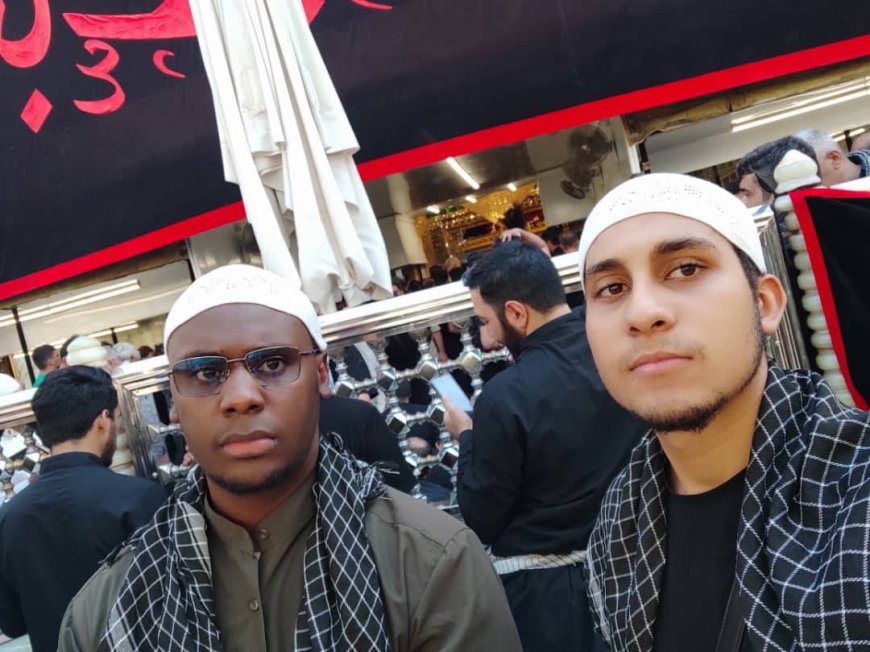From Colombia to Karbala: The Spiritual Odyssey of Ali Saeed and Miguel Díaz
From Colombia to Karbala: The Spiritual Odyssey of Ali Saeed and Miguel Díaz

They claim to be distant relatives, bearing the names Ali Saeed and Miguel Ángel Díaz, hailing from Colombia. Both, aged 17, were born into Muslim and Shiite families. It is worth noting that in their city of Cali, there exists a profound reverence for Imam Hussain (PBUH).
Miguel articulates his sentiments, emphasizing that this marks his inaugural participation in the Arbaeen pilgrimage, a visit to the sacred shrine of Imam Hussein (PBUH). This experience evokes an indescribable sense of fulfillment, akin to a beautiful dream, resonating deeply within his soul. For Miguel, the Arbaeen pilgrimage has long remained a cherished aspiration.
Furthermore, Miguel expounds upon his lifelong affiliation with Islam, growing up within a small yet devout community. The city of Cali, his birthplace, is characterized by an unwavering devotion to Imam Hussain (PBUH). Additionally, Miguel highlights the extensive knowledge possessed by the citizens of Cali regarding Imam Hussain (PBUH), with many scholars having pursued studies in Iran. Countless individuals from Miguel's community have actively participated in the Arbaeen ceremony. In fact, these very individuals have wholeheartedly encouraged Miguel and others to embark on the journey to visit Karbala, despite the considerable geographical distance.
Miguel expresses deep concern regarding the desecration shown towards Islam. He firmly believes that the egregious actions of those who burn the Holy Quran and desecrate other Islamic symbols are not representative of any religion and are in no way related to freedom of expression; rather, such acts are a direct affront to the Almighty God.
For Miguel, the true beauty of Arbaeen lies in the gathering of individuals from diverse backgrounds who travel great distances to partake in the pilgrimage in Iraq. This remarkable display of unity and devotion fills him with a sense of awe and inspiration as it is a testament to the greatness and surprise of this event.
Although initially hesitant and reserved to give an interview, Ali Saeed ultimately consents. Fluent in Farsi and Arabic, he addresses me in Spanish. This marks his third participation in the Arbaeen procession. Reflecting on his initial encounter, he describes it as a profoundly spiritual experience to behold the holy shrine of Imam Ali (PBUH) in Najaf. Overwhelmed with emotion, tears flow freely, as if he is in a blissful dream. The proximity to the sacred shrines of Ahl al-Bayt (PBUT) and the martyrs of Karbala continues to evoke this profound sentiment within him. Every visit to the holy shrines in Iraq rekindles this spiritual connection, an epiphany, as if it were his first pilgrimage.
Ali expressed his desire to extend an invitation to Muslims worldwide, urging their active participation in this remarkable occasion. He underscored the significance of the event, emphasizing the global presence of devotees of Imam Hussain (PBUH) from across the world who eagerly welcome pilgrims. With a smile on his face, Ali marveled at the profundity of this experience, finding it ineffable and beyond description, and encouraged others to personally partake in its unique spiritual journey.
Today, millions of people, both adherents of Islam and those of different faiths, find themselves subjected to various forms of oppression. However, it is during the grand Arbaeen procession, a remarkable assembly fueled by unwavering devotion to Imam Hussein (PBUH) and his cause, that the potential to address the pervasive oppression and socioeconomic crises through the unification of diverse nationalities lies.
Ali noted that “it is imperative to recognize that these predicaments are not exclusive to Muslims alone but rather afflict people from all walks of life. Today, we bear witness to a profound exemplification of this truth as countless individuals congregate to pay homage to Imam Hussain (PBUH). Today, one can feel the resounding cries against oppression reverberate through the air in Karbala, echoing a collective yearning for freedom and human dignity. Indeed, the ideals and principles embodied by Imam Hussain (PBUH) serve as a true roadmap for confronting oppression, championing freedom, and fostering human rights. It is through the adoption of such a model that societies may ultimately attain liberation and effectively address the multifaceted challenges that persist within human communities across the globe.”
Ali emphasizes the interconnectedness of the challenges faced by various nations, including Palestine, Bahrain, and non-Islamic countries. He highlights that even non-Muslim individuals and countries experience oppression, as evidenced by the difficulties encountered in Latin America. However, Ali believes that the observance of Arbaeen holds the potential to address these issues. Through the commemoration of Imam Hussain (PBUH), people can gain profound insights and invaluable teachings that are instrumental in fostering freedom.
Ali Saeed further expands on the significance of security and the role of martyrs in establishing it. Despite the prevalent security concerns in the Middle East, Iraq has managed to attract millions of individuals who can partake in the pilgrimage with their safety assured. This remarkable achievement, according to Ali, owes gratitude to the countless heroes who gallantly sacrificed their lives to safeguard the region and the millions of civilians participating in this sacred journey.
During our pilgrimage, Ali added, we embarked on an adventurous journey, even venturing out into the depths of the night. However, our observations were predominantly limited to the omnipresent security, a testament to the indomitable spirit of those who selflessly laid down their lives in the relentless struggle against terrorist organizations. Their unwavering determination to safeguard security persists, serving as a steadfast pillar of today’s stability. In the end, Ali Saeed imparted a profound message to the Palestinians. Resonating from the very heart of the Arbaeen march, his words echoed with resolute conviction, saying, "I urge my Palestinian brothers and sisters to embrace and continue resistance."
Drawing inspiration from the teachings of Imam Hussein, he emphasized the timeless maxim that epitomizes the human spirit: "To perish with honor is far superior to enduring a life of ignominy."













































